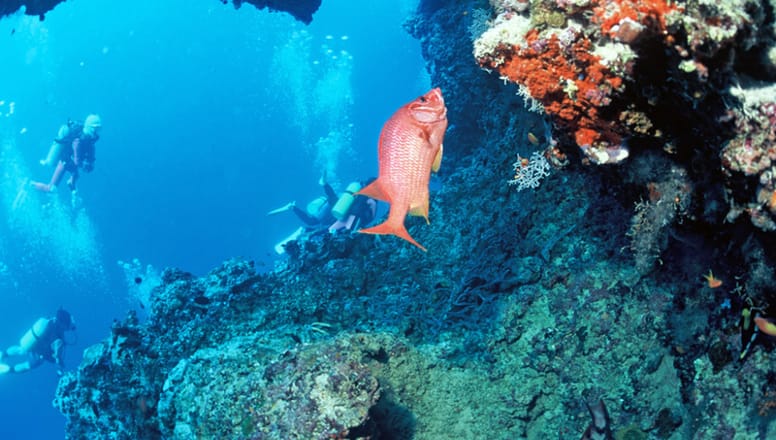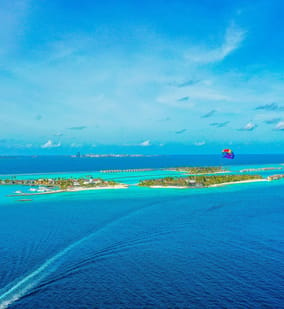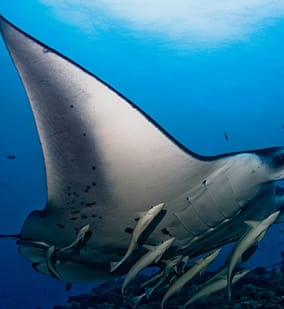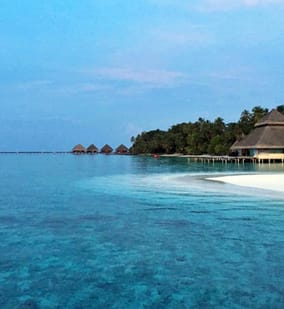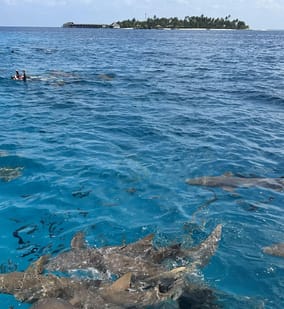More of the Maldives is covered by the underwater than the land. Therefore it is not surprising that the Maldives is known the world over as one of the premier dive destinations of the world.
The country is endowed with thousands of reefs. Over a 1,000 species of fish inhabit these reefs, 300 of which were recorded for the first time in Maldives. Hundreds of species of hard and soft corals adorn the reefs providing dazzling colours.
The reefs are so numerous that divers can literally swim from one to the other. However in spite of this, each dive site has its own special character and appeal.
The outside reefs of the atolls are the fortresses that defend the Maldives from the strong elements. They are solid and impenetrable.
The channels through which currents flow through the Maldives chain feature interesting coral formations such as jagged walls, crevices and caves. Due to the high level of nutrients in the channels divers can find caves and overhangs full of soft coral, a wide range of invertebrates, Gorgonians and sponges. There are also several canyons and the steep drop offs that provide for exciting dives. An exciting array of pelagic, predators and reef fish converge in these areas to feed in the colliding waters filled with nutrients.
Across the channels and within the atolls are Thila, sentinels of rocks that spring from the ocean floor up to within a few meters of the water surface. The Thila attract a variety of marine life and provide a spectacular change of scenery.
Columnist Dave Berry once compared going to the ocean and staying on the surface all the time as similar to going to the circus and staring at the outside of the tent - you're missing the whole point of the ocean.
The sentiment can certainly be applied to the Maldives. Beautiful as the islands and the beaches are, they are nothing compared to the fantastical beauty waiting for you beneath the waves. And the best way to experience this enchanted and exotic world is by diving into it.
While snorkelling is fun and can give you a little glimpse of some of the things waiting for you in the big blue beyond the drop-off, it can't possibly compare to the placidity and serenity that a full hour's worth of air deep underwater provides. The experience is, as many divers have said, "otherworldly".
Before Jacques Cousteau - the most famous underwater explorer the world has ever known - worked out the kinks involved in scuba diving, this incredible marine world was denied to everyone in the air-breathing world above, except those with preternatural lung capacities. But now, thanks to a tank and a regulator, nothing can stand in the way of those who want to experience the aquatic world.
The best thing of course is that learning to dive is not so expensive, easy and simple. Most of the resorts in the Maldives have their own dive centres and usually offer PADI-certified dive courses for beginners who are interested in indulging in something beyond the typical snorkelling experience.
Once you've completed a beginner's course, it's best to stick with some easy dives until you become more familiar with the new environment and equipment. That means no diving into wrecks, caves, or dive spots with low visibility, rushing currents or other treacherous environments. Leave those to the experts.
The practice dives are usually conducted in the shallow areas of the lagoon and since this is the Maldives, even in the shallows there's plenty to see and enjoy. Later, with several hours of practice under the belt, you can probably drop into deeper areas near a reef or a drop-off. Here you can simply drift and float in the water, watching the fish dart about and around corals or follow bigger animals as they make their rounds of the reef.
If you've seen documentaries about tropical reefs and similar TV shows then the sights you see might not be new to you, but the 3-D experience of being there yourself - tropical coral garden surrounded by brightly coloured fish and other forms of marine life - will be nothing like you've experienced before.
Dive centres
One essential feature in each resort in the Maldives is its dive centre. Most of the local islands which has guest houses also provide the opportunity for diving. Although dive centres at different islands may vary in size and the facilities they offer, all dive centres without exception, accept all types of international certificates and offer equipment for rental and the services of professional multilingual dive instructors.
Dive centres operate dive trips daily throughout the year. All dive boats are equipped with radio, life jackets, flag, oxygen and medical kits.
For those learning to dive all resorts and some local islands which has guest houses conduct open water and advanced dive courses and even specialist courses. Most dive centres also houses educational and library facilities and regularly entertain divers with slide and video presentations.
Diving Safety
The best way to appreciate the underwater world of the Maldives is to go slowly, conserving energy and looking around carefully. Nothing compares with a slow drift dive along a reef edge, the gentle currents carrying the diver along as a harmless observer of the environment.
- ◎ Check your equipment and your buddies.
- ◎ Do not stay too long at the surface at the beginning of the dive.
- ◎ Descend quickly to the reef.
- ◎ Do not try to swim against strong currents.
- ◎ Stay close to the reef.
- ◎ Never dive alone – follow the buddy system procedures.
- ◎ Do not misread distance due to the clear visibility.
Water Temperatures
Water temperatures mostly stay within the range of 27 and 30 Celsius. However therm cline can sometimes be experienced at depths below 20 meters.
During the hot periods, water temperature inside the lagoons increases influencing water temperatures inside the atoll. During these times many divers are comfortable diving without a wetsuit. Lycra and 3mm wetsuits are the norm although some prefer 5mm suits for night dives or dives during the rainy season.
Diving on Safaris
Dive safaris offer a totally different dive experience compared to diving from a resort. A safari would give you access to a much wider variety of dive sites in several atolls, many of which are beyond the main dive circuit. Safaris are operated throughout the year, the best weather for safaris is during the period from November to April. The vessels range in size and facilities offered.

